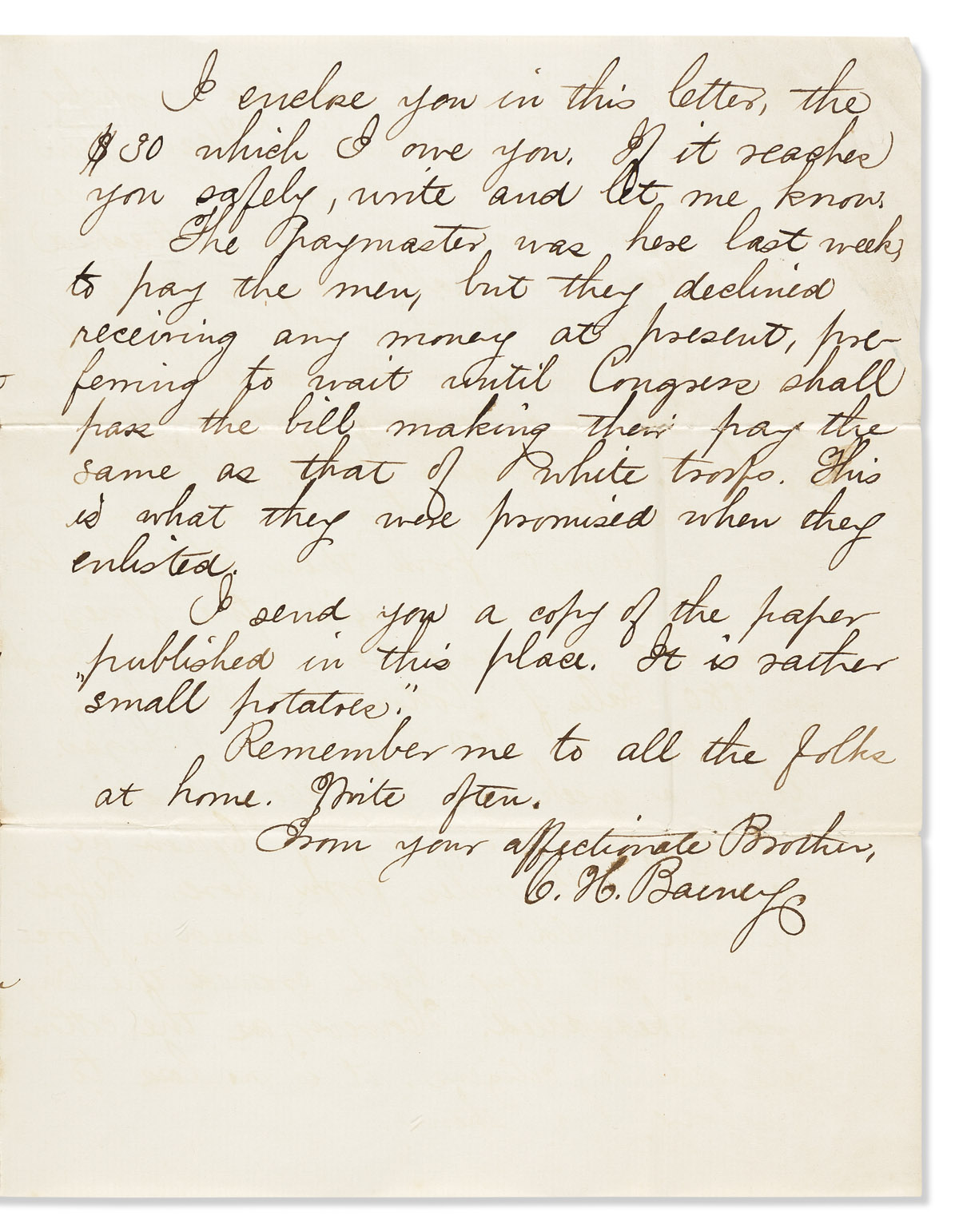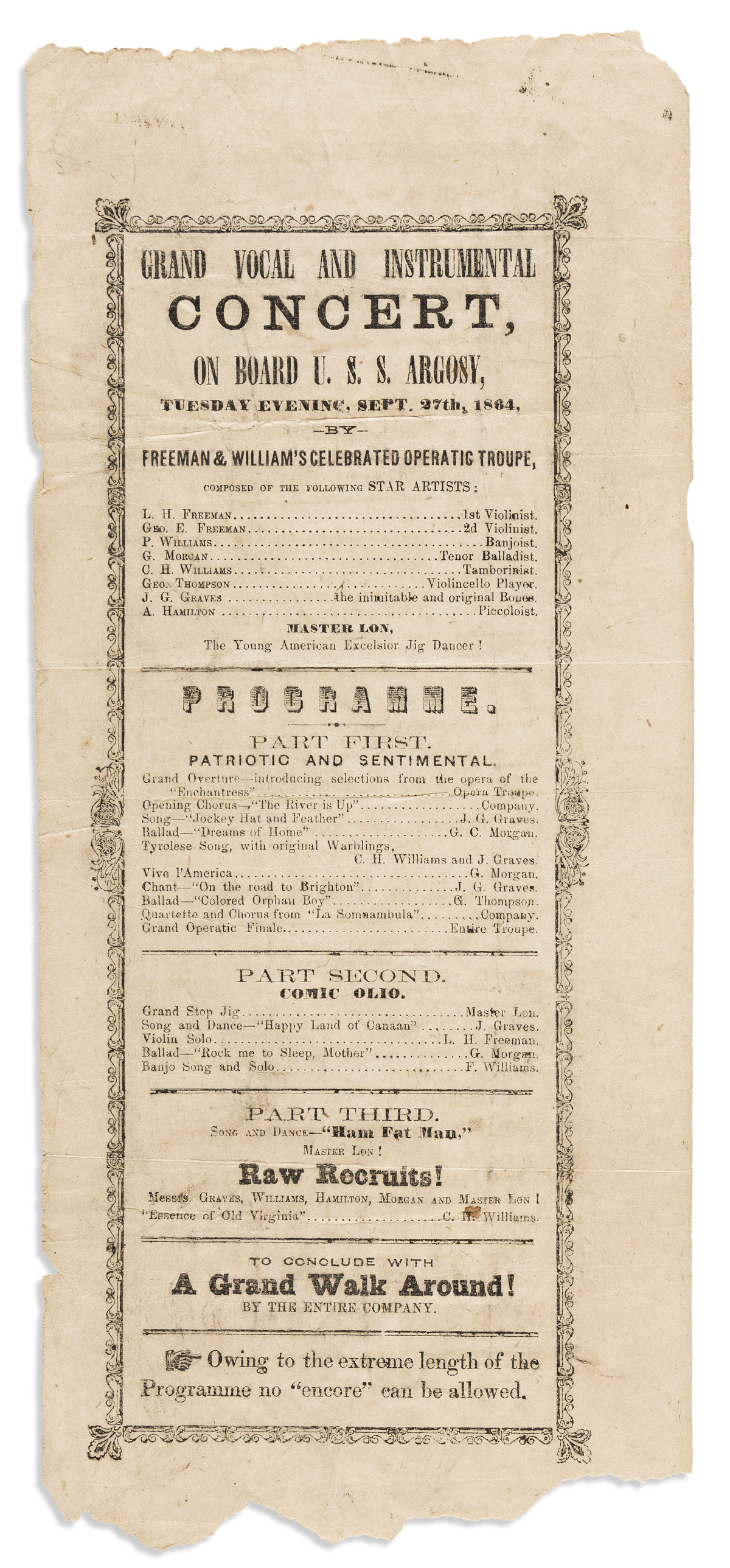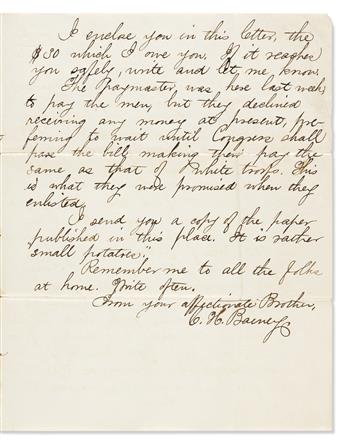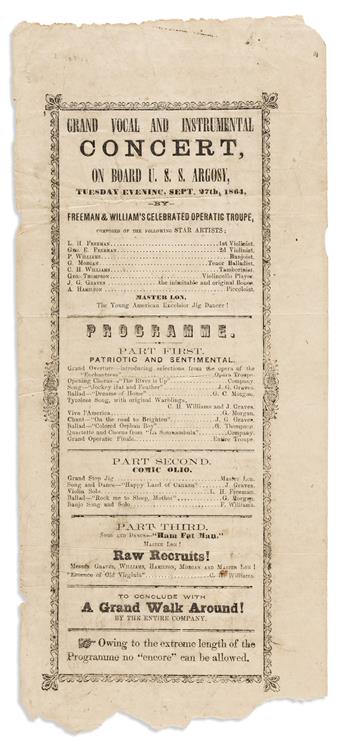Sale 2598 - Lot 323
Price Realized: $ 5,200
Price Realized: $ 6,500
?Final Price Realized includes Buyer’s Premium added to Hammer Price
Estimate: $ 2,000 - $ 3,000
(MILITARY--CIVIL WAR.) Correspondence of an officer of the 14th R.I. Heavy Artillery Regiment (Colored). 17 Autograph Letters Signed to sister Julia Ann Barney (1846-1912) of Leonard's Corner [East Providence], RI, and 2 pieces of ephemera sleeved in one binder; minor wear; all but one of the letters with original stamped envelopes bearing New Orleans postmark. Louisiana, January to June 1864 (letters)
Additional Details
These letters were written by an officer in the 14th Rhode Island Heavy Artillery, later known as the 11th United States Colored Heavy Artillery, which spent the war in Louisiana. Caleb Henry Barney (1844-1904) of East Providence, RI served as a first lieutenant and adjutant with the regiment's second battalion from December 1863 to October 1865, which was mainly stationed at Plaquemine on the Mississippi northwest of New Orleans, just south of Baton Rouge. His letters include interesting commentary on the regiment's Black troops, and on the newly freed men and women of Louisiana.
On arriving in Louisiana on 21 February 1864, he boasts that "we can't be beat much, by any body of troops with the same experience. Our dress parades, particularly, are very fine." By 31 March, he notes that "The people of this place are altering their opinion of colored soldiers very much since they have had an opportunity to see that they know how to behave themselves as well as white men." The battalion saw the passenger steamer J.H. Russell burning on the river, and made themselves useful in the community: "We turned out a large detail immediately and they went to work saving the cattle, hogs, and mules which were aboard." On 25 April, waiting for a rebel attack, he hopes "we shall have a little brush, just to show the people of this secesh town that 'niggers' will fight." He also comments on the scandalous mistreatment of his troops, who were (like all of the Colored Troops) receiving unequal pay: "The paymaster was here last week to pay the men, but they declined, preferring to wait until Congress shall pass the bill making their pay the same as that of white troops. This is what they were promised when they enlisted."
On the local freedmen, he notes on 21 February that "slavery is dead anyhow, and a system of compensated labor is being established, the planters being required to pay so much per month to every hand employed by them, & the negroes are allowed to choose their own masters." An important order by the military government was noted on 4 June: "There is an order from Gen. Banks that all negroes who have been living together as man and wife, but who were only married by jumping over the broomstick, etc., must now be legally married by the provost marshals of the several parishes, and are to have a certificate of their marriage, same as white folks. There will consequently be a large number of marriage ceremonies during the ensuing summer." The letters end in June 1864, although Barney remained with the regiment until they were mustered out in October 1865. A more detailed summary of his letters is available upon request.
Included with the letters are two other items. One is a manuscript mock newspaper titled "Roanoke Press," written by Barney for his family on 22 February 1862 while he was with the 5th Rhode Island Infantry. He describes a scouting party which discovered a "negro woman with a huge whiskey bottle in her hand" who fled from them "as fast as her legs could carry her." Also included is a 27 September 1864 broadside playbill for "Grand Vocal and Instrumental Concert on Board the U.S.S. Argosy," a patrol boat which was based on the Mississippi south of Plaquemines. It was apparently a minstrel show given by 9 performers including "Master Lon, the Young American Excelsior Jig Dancer."
On arriving in Louisiana on 21 February 1864, he boasts that "we can't be beat much, by any body of troops with the same experience. Our dress parades, particularly, are very fine." By 31 March, he notes that "The people of this place are altering their opinion of colored soldiers very much since they have had an opportunity to see that they know how to behave themselves as well as white men." The battalion saw the passenger steamer J.H. Russell burning on the river, and made themselves useful in the community: "We turned out a large detail immediately and they went to work saving the cattle, hogs, and mules which were aboard." On 25 April, waiting for a rebel attack, he hopes "we shall have a little brush, just to show the people of this secesh town that 'niggers' will fight." He also comments on the scandalous mistreatment of his troops, who were (like all of the Colored Troops) receiving unequal pay: "The paymaster was here last week to pay the men, but they declined, preferring to wait until Congress shall pass the bill making their pay the same as that of white troops. This is what they were promised when they enlisted."
On the local freedmen, he notes on 21 February that "slavery is dead anyhow, and a system of compensated labor is being established, the planters being required to pay so much per month to every hand employed by them, & the negroes are allowed to choose their own masters." An important order by the military government was noted on 4 June: "There is an order from Gen. Banks that all negroes who have been living together as man and wife, but who were only married by jumping over the broomstick, etc., must now be legally married by the provost marshals of the several parishes, and are to have a certificate of their marriage, same as white folks. There will consequently be a large number of marriage ceremonies during the ensuing summer." The letters end in June 1864, although Barney remained with the regiment until they were mustered out in October 1865. A more detailed summary of his letters is available upon request.
Included with the letters are two other items. One is a manuscript mock newspaper titled "Roanoke Press," written by Barney for his family on 22 February 1862 while he was with the 5th Rhode Island Infantry. He describes a scouting party which discovered a "negro woman with a huge whiskey bottle in her hand" who fled from them "as fast as her legs could carry her." Also included is a 27 September 1864 broadside playbill for "Grand Vocal and Instrumental Concert on Board the U.S.S. Argosy," a patrol boat which was based on the Mississippi south of Plaquemines. It was apparently a minstrel show given by 9 performers including "Master Lon, the Young American Excelsior Jig Dancer."
Exhibition Hours
Exhibition Hours
Aliquam vulputate ornare congue. Vestibulum maximus, libero in placerat faucibus, risus nisl molestie massa, ut maximus metus lectus vel lorem.






